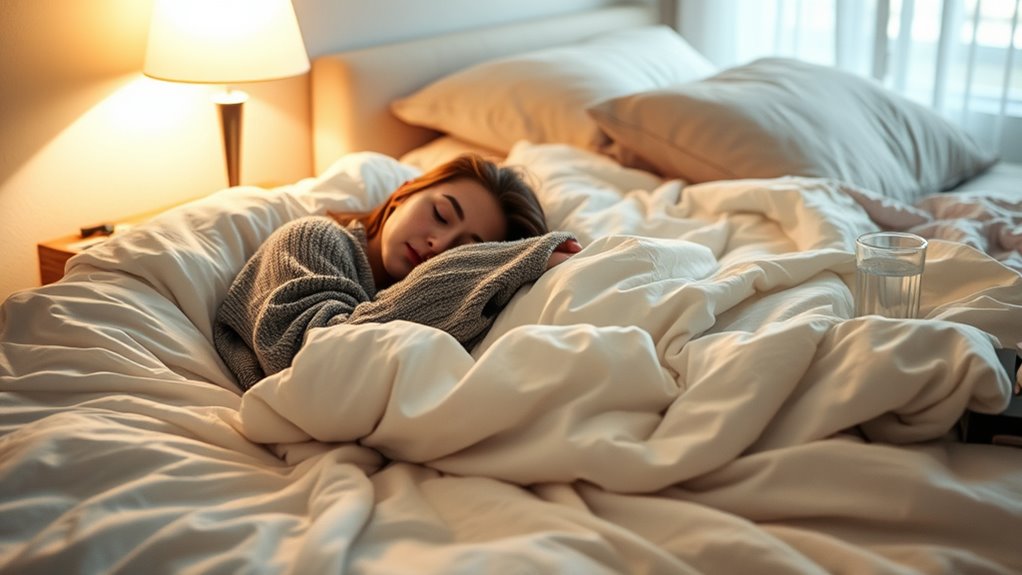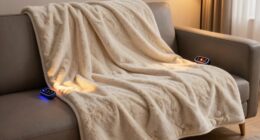To sleep well when you’re sick, start by timing your medications earlier in the day and avoiding stimulants or diuretics before bedtime. Create a cozy environment with a cool, dark, and quiet room, and use supportive bedding and extra pillows. Stay hydrated during the day but limit liquids at night. Practice calming routines like listening to music or deep breathing. If you keep exploring, you’ll find more tips to help you rest better and recover faster.
Key Takeaways
- Adjust medication timing to earlier in the day and avoid stimulants near bedtime to prevent sleep disruption.
- Create a comfortable sleep environment with optimal temperature, darkness, noise reduction, and supportive bedding.
- Stay well-hydrated during the day but limit fluids before bed to reduce nighttime bathroom trips.
- Establish a calming pre-sleep routine with relaxation techniques and avoid screens at least an hour before sleep.
- Prioritize restful sleep to support immune function and recovery, using proper bedding and environmental adjustments.

When you’re sick, getting quality sleep can feel impossible, but it’s essential for recovery. Your body needs rest to fight off illness, repair tissues, and regain strength. To improve your sleep, start by paying attention to your medication timing. Many medications, especially those with stimulants or diuretics, can interfere with your ability to fall asleep or stay asleep. If you’re taking anything that might disrupt your rest, try to schedule doses earlier in the day or as directed by your healthcare provider. This way, you reduce the chances of medication side effects sabotaging your sleep cycle. Also, avoid taking unnecessary medications close to bedtime, as they might cause discomfort or wakefulness.
Prioritize medication timing to minimize sleep disruption during illness recovery.
Creating an ideal sleep environment is equally important. When you’re sick, your bedroom should be a sanctuary for rest. Keep the room cool, ideally between 60 and 67 degrees Fahrenheit, since a comfortable temperature helps your body relax. Darkness is vital, so use blackout curtains or an eye mask to block out any light, which can disrupt melatonin production. Noise can be disruptive too, so consider using earplugs or a white noise machine if your environment is noisy. Your bed should be comfortable, with supportive pillows and clean, soft bedding to help you stay cozy during bouts of coughing or congestion.
If you’re experiencing congestion or a sore throat, elevating your head with extra pillows can make breathing easier and prevent mucus from pooling. This position can also improve sleep quality. Hydration plays a key role; drink plenty of fluids during the day, but try to cut back on liquids an hour before bed to minimize nighttime trips to the bathroom. Avoid caffeine and alcohol close to bedtime, as they can interfere with your sleep cycle and worsen dehydration or congestion.
Establishing a calming pre-sleep routine can also help signal your body that it’s time to rest. Gentle activities like reading, listening to soothing music, or practicing deep breathing exercises can ease your mind and relax tense muscles. Avoid screens at least an hour before bed because the blue light emitted can suppress melatonin, making it harder to fall asleep. When you combine proper medication timing with an ideal sleep environment, you’ll increase your chances of getting restful sleep even when you’re under the weather. Remember, giving your body the rest it needs accelerates healing and helps you bounce back faster. Additionally, choosing a high-quality mattress can significantly impact your sleep comfort and recovery process.
Frequently Asked Questions
Can Certain Medications Affect My Sleep Quality While Sick?
Certain medications can impact your sleep quality by causing medication side effects that lead to sleep disruption. You might find it harder to fall asleep or stay asleep through the night. It’s important to check your medication labels and talk to your healthcare provider about potential sleep-related side effects. Adjusting the timing or dosage might help minimize sleep disruption, so don’t hesitate to seek advice for better rest while you’re sick.
Is It Better to Sleep Upright or Flat When Congested?
When you’re congested, sleeping upright is usually better than lying flat, as it helps ease congestion and breathing. Sleeping positions that elevate your head promote better airflow and reduce sinus pressure, providing congestion relief. Use extra pillows to keep your head raised comfortably. Avoid sleeping flat, which can worsen congestion and make breathing difficult. This position helps you breathe easier and rest more soundly while you recover.
How Do I Manage Sleep Anxiety During Illness Recovery?
You can manage sleep anxiety during your illness recovery by focusing on your sleep environment and practicing mindfulness techniques. Create a calming space free of distractions, dim the lights, and keep your room at a comfortable temperature. Use deep breathing or meditation to ease your mind. These strategies help reduce anxiety, making it easier to relax and fall asleep, supporting your body’s healing process.
Are Naps Helpful or Disruptive During Illness Recovery?
Naps can be your secret weapon or your sleep thief, depending on how you use them. Short naps, around 20-30 minutes, boost your rest without disrupting nighttime sleep. They support your recovery by supplementing your total rest duration and improving sleep hygiene. However, long or late-day naps might leave you tangled in a web of disrupted sleep patterns. Listen to your body and balance naps to help your body heal faster.
What Are Natural Remedies to Improve Sleep When Sick?
When you’re sick, natural remedies can really help improve your sleep. Try sipping warm herbal teas like chamomile or peppermint, which have calming effects. Using aromatherapy diffusers with lavender or eucalyptus can create a soothing environment. These simple methods promote relaxation, making it easier for you to fall asleep and rest properly. Incorporating herbal teas and aromatherapy into your routine supports your body’s healing process naturally.
Conclusion
Remember, good sleep is your best medicine when you’re sick. By creating a cozy environment and listening to your body, you help your recovery sail smoothly like a gentle boat on calm waters. Rest is your ally, guiding you through the storm of illness with the promise of brighter, healthier days ahead. So, prioritize your sleep, nurture yourself, and trust that each restful night is a step closer to feeling your best again.









